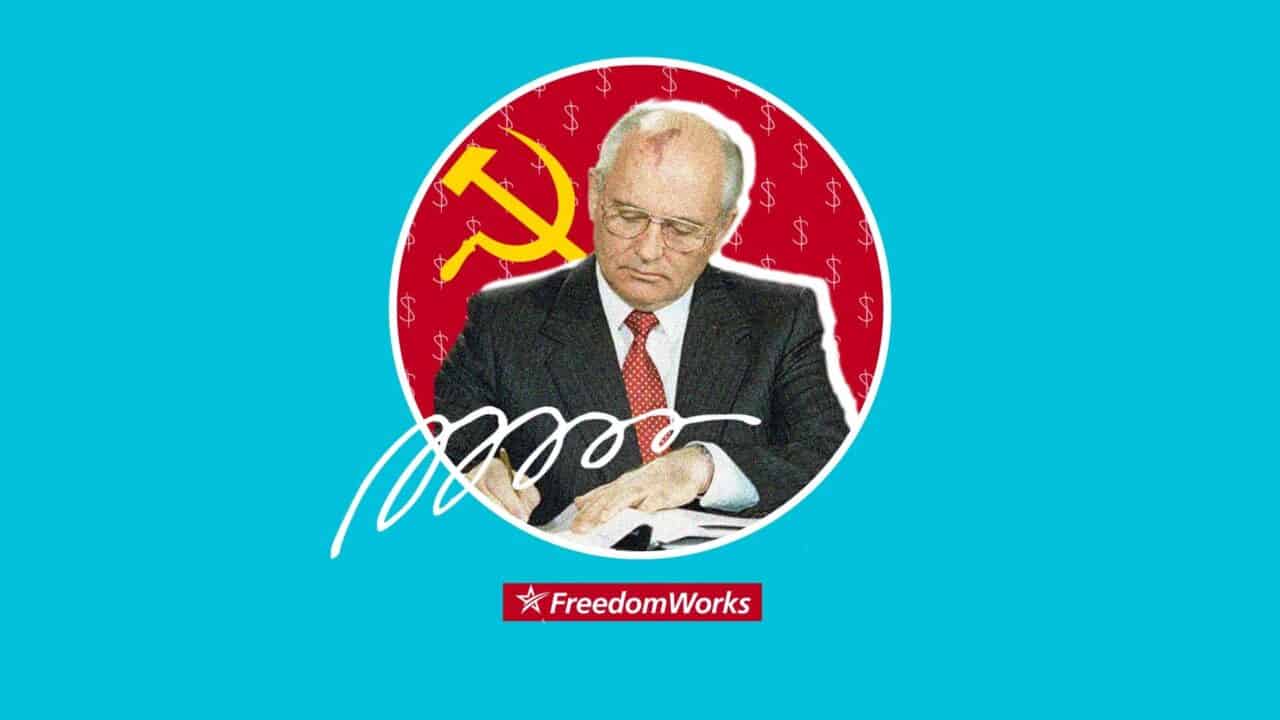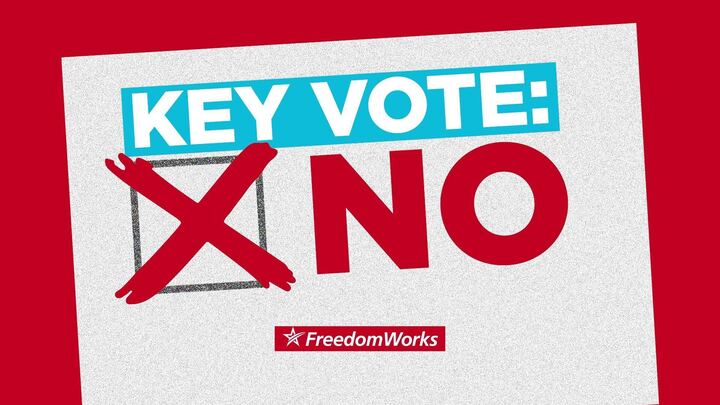Mikhail Gorbachev Didn’t ‘End the Cold War,’ He Kneeled to Reality

As seen in Real Clear Markets
It was 1988, and President Ronald Reagan was speaking at a summit in Moscow. In a style that few could emulate, Reagan told a joke. It went like this:
“An American man, boasting to his Russian friend, says the USA is such a great country that anyone can walk up to the White House and shout ‘The President of the United States is a liar and a crook!’ But the Russian shrugs. ‘So what?’ he says. ‘In my country, too, anyone can walk right up to the Kremlin and shout ‘The President of the United States is a liar and a crook!’”
As the great British historian Martin Sixsmith described it (he was a reporter in Moscow at the time) in his excellent new book, The War of Nerves, “Reagan flashed his winning smile as he weaponized the humour of the Russian people to score ideological points off the Russian state.” Yes indeed. Reagan had quite the strategic mind, which is something his ideological opposites still refuse to accept. But we’re in a sense getting ahead of ourselves.
Going back nearly thirty years before Reagan playfully teased the Soviet Union inside the Soviet Union, there was an agreement entered into by U.S. and Soviet leaders to stage joint exhibitions in both countries. It proved a monumental blunder for the Soviets. It was arguably one of the biggest errors committed by the repressive country’s leadership beyond the massive insult to human nature that was communism itself. Imagine permitting an American Exhibition in Moscow that would showcase among other things, the typical American kitchen.
The year was 1959, and as Sixsmith reports, “Over 2 million visitors came to see it during its six week run.” The lines to catch a glimpse of how the “enemy” lived were apparently endless. Sixsmith cites jazz musician Alexei Kozlov’s recollection of how the Soviet leadership “lost their hold over so many by raising the Iron Curtain for even a month.” Kozlov reported that “We were stunned and couldn’t believe that people actually lived like that.” Precisely.
What Kozlov and millions of Soviets saw, but American economists and intelligence types didn’t understand, was that communism’s suffocation of individual initiative and the profit motive would logically fail in abject fashion. The American kitchen on display in Moscow said so much, only for the reality of it to be lost on those whom it should have emboldened the most. Since the American elites didn’t see the obvious, the Cold War lasted much longer than it ever should have.
Back to Reagan, he somewhat uniquely understood what the economic and intelligence establishment in the U.S. did not. As he confided to Richard Allen, his first national security advisor, his approach to the Cold War would be cocky as hell: “We win and they lose.” Once again, precisely. Reagan got it. American elites didn’t get it. Of course the U.S. would win. What Reagan lacked in book smarts was more than made up for by common sense that those long on degrees and credentials plainly lacked. Reagan innately knew communism could never match up with freedom. There was no bluster in what he told Allen.
All of this and more came to mind while reading the various obituaries and commentary on Mikhail Gorbachev, who died last week. Almost without fail the remembrances of Gorbachev indicated that he “ended the Cold War.” What a laugh. Gorbachev did no such thing.
As George Will put it in his own commentary, commentary that near uniquely didn’t embrace the Gorbachev hagiography, the man who oversaw the dismantling of the Soviet Union didn’t want to. Gorbachev very much believed in this intensely cruel, freedom suffocating, historically murderous nation, and wanted it to survive. Which is a reminder that Gorbachev didn’t “end the Cold War” as boldfaced thinkers like Maureen Dowd strangely asserted as much as reality intruded on Gorbachev’s anti-human, and rather naïve understanding of humanity. Really, imagine wanting to maintain such a failed country defined by what Hedrick Smith described in The Russians as “lines for everything.”
With Reagan, it wasn’t about whether the Soviet Union would survive. Reagan knew it would not. It’s so easy to see the genius of his 1982 Westminster address now, but at the time policy elites thought he was nuts for bluntly speaking of “policy” that would put communism in the rear-view mirror, or that more specifically would leave it on “the ash heap of history.” Keep in mind that in 1982, the policy crowd thought the Soviet Union our equal with an economy to match. They didn’t get it.
Notable here is that around the time of Reagan’s unflinching Westminster speech, Cato Institute co-founders Ed Crane and Charles Koch visited the Soviet Union. Crane returned only to write an essay that was blunt in its assertion that the Soviet Union not only wouldn’t survive, but that it wasn’t a threat as is. Crane’s essential insight, one that mirrored Reagan’s view of this failed country, was that in crushing freedom of action, production, and thought, the Soviets lacked an economy, and by extension the resources necessary to pose a threat to the United States.
Reagan knew what Crane knew. Without an economy, the Soviets couldn’t keep up with the world’s freest nation, one that was populated by the world’s most economically dynamic people. In the words of Sixsmith, “Washington could afford” the Cold War, while “Moscow could not.”
Ultimately Gorbachev woke up to the reality that Reagan had long understood. In a fitting end to his run at the top of the soon-to-be-defunct Soviet Union, he agreed to sign his resignation only for his “Soviet-made pen” to not work. How very fitting. Gorbachev ended nothing. Reality yet again intruded on his tragic belief in what was hideously cruel. Gorbachev ultimately “kneeled” as coaches do here when they know the game is over. For U.S. policy types to write otherwise, as they have, is truly shameful.



